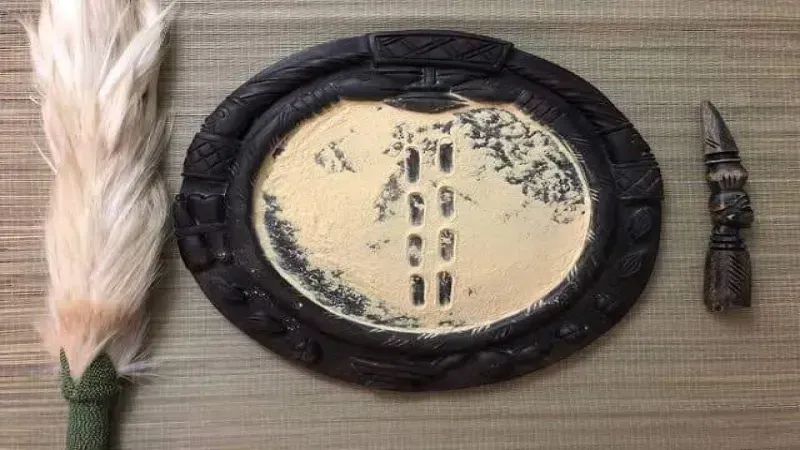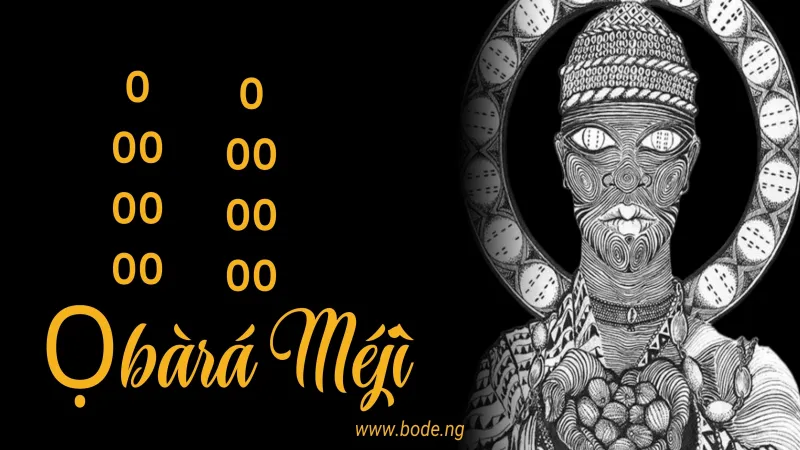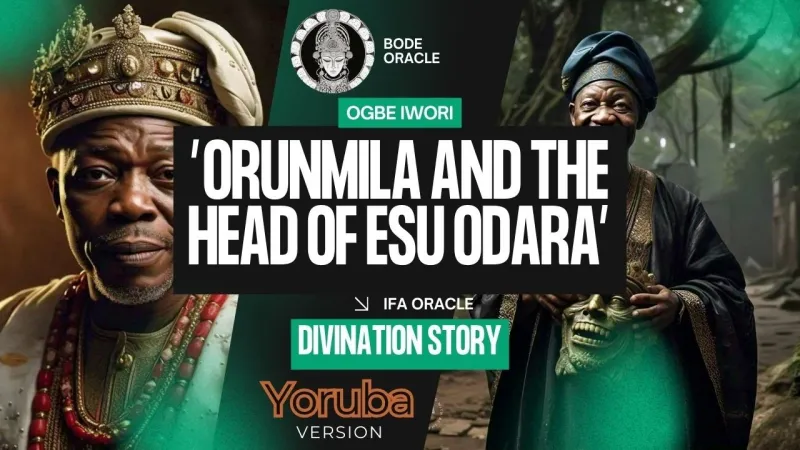Odu Ifa Merindinlogun (the 16 principal Odus) form a vital collection of sacred texts. This extensive compilation of stories, poems, proverbs, and chapters embodies the core of Yoruba wisdom.
It addresses life's various challenges and provides devotees with direction on their spiritual journeys, helping them navigate the complexities of existence.
In Odu Ifa Merindinlogun, the arrangement of the cowrie shells after being cast by the priest or priestess is interpreted to discern divine messages.
Deeply intertwined with the spiritual and philosophical beliefs of the Yoruba people, the Ifa divination system provides unique perspectives on life's complexities, destiny, divination, and the divine.
What is Odu Ifa?
The term Odu Ifa refers to the sacred verses within the Ifa corpus, which are central to the divination process in the Ifa religion. These verses encapsulate the wisdom imparted by the gods, or Orisa, and are essential in interpreting the messages received during divination rituals.
The entire corpus consists of 256 Odus, each containing specific verses and interpretations, serving as a profound source of spiritual guidance.
The custodians of the Odu Ifa system are the Babalawo (male) or Iyanifa (female), revered Ifa priests who undergo extensive training and initiation to master this divination art.
Acting as intermediaries between the physical and spiritual realms, these priests use intricate rituals, sacred chants, and the casting of Ifa divination tools to uncover the hidden wisdom within the Odu Ifa, offering profound insights and guidance to seekers.
If you're looking to learn more about Ogundabede, don’t miss our detailed post on what Odu Ifa Ogundabede is.
Odu Ifa Merindinlogun Meaning and Structure
The term Merindinlogun translates to "sixteen," referring to a method of divination that uses sixteen cowrie shells. This system is seen as a simplified version of the comprehensive Ifa divination typically performed by Babalawos (priests) using the sacred Ifa chain (opele) or palm nuts.
While Merindinlogun is mainly used by priestesses and priests within the Orisa traditions—such as Ogun, Esu, and Yemoja—it still holds significant spiritual weight within these practices.
The patterns formed by the shells, which land either face-up or face-down, correspond to specific Odu from the Merindinlogun corpus.
Each of these patterns reveals guidance, warnings, or blessings from the Orisa, offering insights into a person's life and circumstances.
The divination process begins by invoking the Orisa and requesting their guidance. The priest or priestess then casts the sixteen cowrie shells, and their resulting pattern determines the associated Odu.
Each Odu is more than just a simple message—it is connected to a particular Orisa, acting as a direct communication channel between the divine and the individual.
These patterns reveal stories and insights related to the person’s current situation or their future path. Orisa play a central role in Merindinlogun divination as intermediaries between humanity and Olodumare, the supreme being.
Each Odu carries the message of a particular Orisa, and through the arrangement of the cowrie shells, they convey divine wisdom, offer solutions to problems, and provide guidance for spiritual development.
Every Odu contains a mix of proverbs, songs, and rituals that shape the framework for divination. The priest or priestess, with deep knowledge of these verses, delivers guidance accordingly.
For example, if someone is experiencing conflict, the associated Odu may suggest a ritual offering (ebo) or specific actions aimed at restoring harmony in their environment.
This detailed interpretation ensures that devotees receive the spiritual direction they need for their personal or communal journeys.
Want to know how far Ifa has spread? Check out our detailed guide on where Ifa religion is practiced.
Differences Between Ifa and Merindinlogun Divination
While both Ifa and Merindinlogun divinations derive their insights from the same Odu corpus, the tools and practices used in each system differ.
Ifa divination typically involves the use of the opele (divination chain) or ikin (palm nuts) and is conducted by a Babalawo, focusing on complex and in-depth spiritual consultations.
Merindinlogun divination, which uses cowrie shells, is simpler and is often performed by Orisa priests or priestesses. This distinction reflects the differing roles each system plays in spiritual guidance and practice.
The Odu Ifa Merindinlogun system carries deep spiritual significance, extending beyond mere fortune-telling. It serves as a direct connection between the human and divine realms.
The sixteen cowrie shells used in this process symbolize not only individual destinies but also the broader relationship between the physical world and the Orisa.
Through this system, individuals can gain insights into their life’s purpose, overcome challenges, and learn the steps required to align their destiny with divine will.
Learn more about the spiritual meaning behind Ogbe Iwori by checking out our blog post here.
The Concept of Good Character (Iwa Pele)
A central principle in both Ifa tradition and Merindinlogun divination is the concept of Iwa Pele, meaning “good character.” The teachings of the Odu often emphasize the importance of cultivating virtues such as kindness, patience, and integrity.
Divination results do not only provide practical guidance but also stress the ethical and moral growth of the individual. Maintaining Iwa Pele is considered essential for achieving a harmonious life and aligning one's destiny with the spiritual laws of the universe.
In this sense, Merindinlogun divination offers more than just insight into future events—it is a tool for spiritual and moral development.
The wisdom gained through interpreting the Odu guides individuals toward cultivating better character and living in harmony with their destiny, the divine will, and the universe itself.



